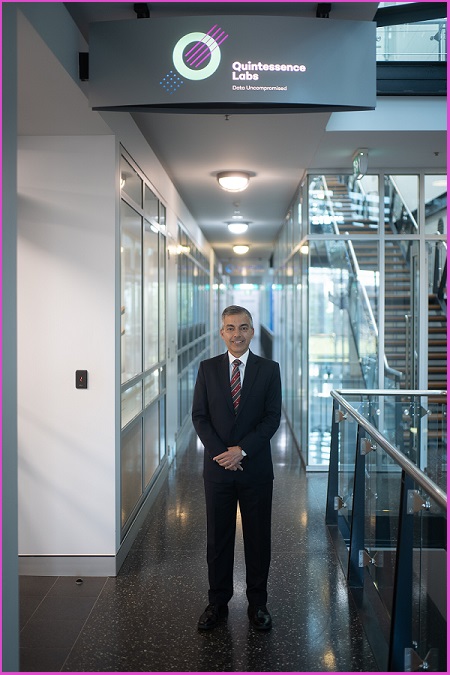The controversial AUKUS defence deal has proved to be fortuitous for Canberra-based quantum-safe encryption firm QuintessenceLabs (QLabs), which is accelerating its overseas expansion after a $25m capital raising that will help it engage with IT executives who are increasingly concerned about the threat of quantum decryption algorithms.
The investment – led by CSIRO-backed VC Main Sequence and Canadian firm TELUS Ventures – “is all about supporting scale-up” for the company, QLabs founder and CEO Dr Vikram Sharma told Information Age.
QLabs has deployed its quantum-based Trusted Security Foundation (TSF) technology in a dozen “marquee customers” including Fortune 500 companies across ten countries, he said, and is focused on building out its US sales, business development and marketing presence “and really scaling it up to be a global organisation”.

QLabs founder and CEO Dr Vikram Sharma
And while the pandemic had forced QLabs to shelve planned UK expansion for a time, the recently-announced AUKUS technology-sharing deal – which includes technology-development partnerships in areas such as cybersecurity and quantum computing – had revived that roadmap in an unexpected way.
“The geopolitical context aligns itself exactly with our plans,” Sharma said, noting that “we believe we will be very well positioned to contribute towards that agenda.”
The funding is a vote of confidence in a “disproportionately strong” Australian quantum-computing industry driven by innovations such as room-temperature quantum computers and a locally-built quantum control chip that will help quantum systems scale to massive sizes.
QLabs’ particular area of focus – developing ‘quantum-safe’ encryption techniques that can survive brute-force attacks by quantum computers that can decrypt conventional encryption algorithms within seconds – has gained urgency for security practitioners keenly aware that rapidly-improving quantum technology means ‘Q-Day’ is ever more imminent.
“As computing power increases exponentially, the tools needed to secure critical data and assets must stay several steps ahead,” Main Sequence partner Bill Bartee said, noting the value of QLabs’ technology to “help protect sovereign and commercially sensitive information… with a critical layer of protection.”
Surviving the quantum era
Quantum computers pose major problems for the encryption algorithms used for everything from protecting website visits and online purchases, to securing smartphone messaging tools and protecting remote workers from cybercriminal attack.
To get a quantum computer to decrypt an encrypted piece of data, algorithms use brute-force techniques in which they test every possible encryption key until they find the one that was used to encrypt the data.
Quantum security tools leverage the natural characteristics of quantum computing to generate truly random keys that cannot be reverse-engineered.
Using quantum techniques to improve security is one of the first viable “nearest term applications” for the technology, Oxford Quantum Circuits CEO Ilana Wisby said during a recent webinar, noting that there is “very exciting work in the pipeline” for security and pharmaceutical applications.
“We’re really on the cusp,” she continued, “and making sure that we help end users identify these really useful, meaningful problems is going to be really important.”
The US-based National Institute of Science and Technology (NIST) is undergoing an extensive evaluation process to choose a universal PQC standard; the process is currently in its third round, with a draft standard expected next year.
Accommodating PQC algorithms is driving an increased need for “cryptographic agility”, VMware Research senior staff researcher David Ott recently explained, noting in a recent demonstration that “cryptographic agility is simply good engineering [and] a proactive way to support future standards migration.”
Interest in quantum computing has surged, with Gartner fielding more than twice as many client engagements about the technology in the last three years.
This is expected to more than quadruple in the next three years, VP analyst Chirag Dekate told the firm’s recent IT Symposium, noting that the firm is tracking over 50 companies that have “already started their quantum journeys” and regularly discusses the technology with CIOs, enterprise architects, application development teams, and infrastructure and operations teams.
Quantum computing “is not a general purpose technology”, he warned, noting that general-purpose productivity in quantum computing is still a decade away and that vendors needed to be wary of vendors that “over promise and under deliver”.
Security is one of just five areas where quantum computing is showing early promise, he said – the others are optimisation problems, organic chemistry, biochemistry simulations, and materials science – and growing interest in quantum encryption and PQC techniques validated QLabs’ specific industry focus.
Businesses interested in quantum should, Chirag said, prioritise use cases based on business impact; focusing on developing skills and choosing partners; and building internal quantum working groups to “focus value capture”.
“Quantum computing is applicable for a very special class of problems and can deliver transformative impact,” he said, “but you need really large systems that are just not around just yet.…. Capturing value from quantum computing will require a team effort.”










